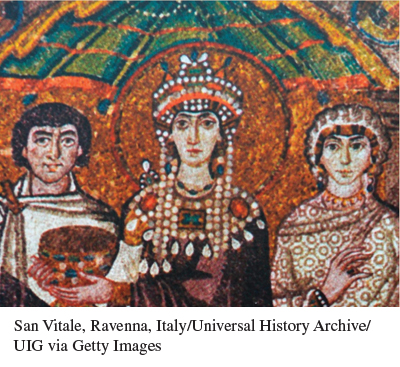A History of Western Society: Printed Page 213
A History of Western Society, Concise Edition: Printed Page 214
Individuals in Society
Theodora of Constantinople
T he most powerful woman in Byzantine history was the daughter of a bear trainer for the circus. Theodora (ca. 497–548) grew up in what her contemporaries regarded as an undignified and morally suspect atmosphere, and she worked as a dancer and burlesque actress, both dishonorable occupations in the Roman world. Despite her background, she caught the eye of Justinian, who was then a military leader and whose uncle (and adoptive father) Justin had himself risen from obscurity to become the emperor of the Byzantine Empire. Under Justinian’s influence, Justin changed the law to allow an actress who had left her disreputable life to marry whom she liked, and Justinian and Theodora married in 525. When Justinian was proclaimed co-
Most of our knowledge of Theodora’s early life comes from the Secret History, a tell-

In one of his official histories, The History of the Wars of Justinian, Procopius presents a very different Theodora. Riots between the supporters of two teams in chariot races — who formed associations somewhat like both street gangs and political parties — had turned deadly, and Justinian wavered in his handling of the perpetrators. Both sides turned against the emperor, besieging the palace while Justinian was inside it. Shouting “N-
For one who has reigned, it is intolerable to be an exile. . . .
Justinian rallied, had the rioters driven into the hippodrome, and ordered between thirty thousand and thirty-
Other sources describe or suggest Theodora’s influence on imperial policy. Justinian passed a number of laws that improved the legal status of women, such as allowing women to own property the same way that men could and to be guardians over their own children. Justinian is reputed to have consulted her every day about all aspects of state policy, including religious policy regarding the doctrinal disputes that continued throughout his reign. Theodora’s influence over her husband and her power in the Byzantine state continued until she died, perhaps of cancer, twenty years before Justinian. Her influence may have even continued after death, for Justinian continued to pass reforms favoring women and, at the end of his life, accepted her interpretation of Christian doctrine. Institutions that she established, including hospitals, orphanages, houses for the rehabilitation of prostitutes, and churches, continued to be reminders of her charity and piety.
Theodora has been viewed as a symbol of the manipulation of beauty and cleverness to attain position and power, and also as a strong and capable co-
QUESTIONS FOR ANALYSIS
- How would you assess the complex legacy of Theodora?
- Since the official and unofficial views of Procopius are so different regarding the empress, should he be trusted at all as a historical source?